Have you really lived if you’ve never enjoyed the Chilean terremoto on a sizzling summer day?

marcellocariaga / instagram.com

Have you really lived if you’ve never enjoyed the Chilean terremoto on a sizzling summer day?

marcellocariaga / instagram.com

IS IT MIDNIGHT YET??
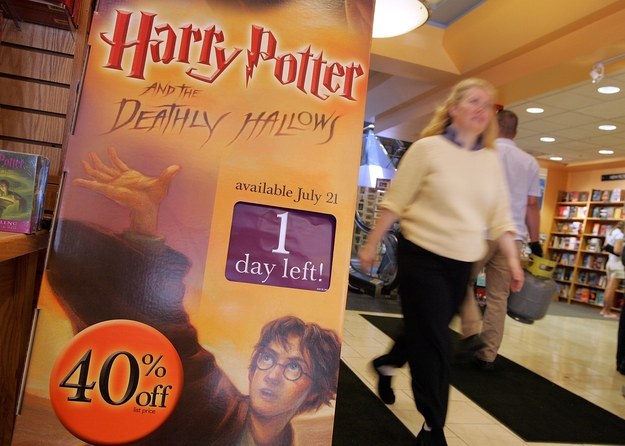
Justin Sullivan / Getty Images
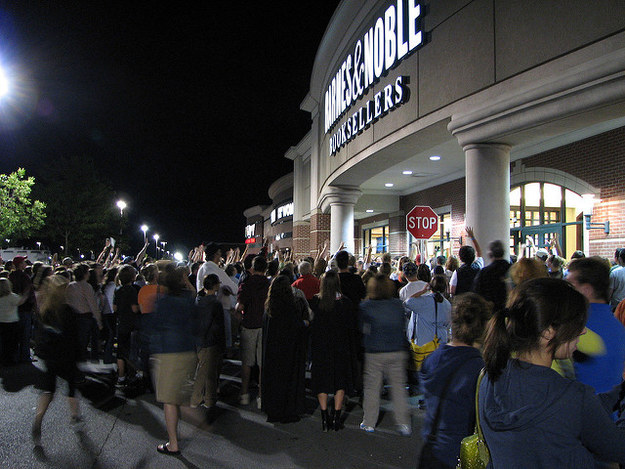
Flickr: grilledcheese / Creative Commons

Bertrand Langlois / AFP / Getty Images
These are a little more ~subtle~ than Albus Severus.

After: Harry Potter
Andrew Phillips / Unsplash / BuzzFeed

After: Hermione Granger
Austin Schmid / Unsplash / BuzzFeed

After: Ron Weasley
Grzegorz Mleczek / Unsplash / BuzzFeed

After: Sirius Black
Caleb Ralston / Unsplash / BuzzFeed
Don’t judge a book by its dusty cover.

Definitely not the type of book you'd ever actually ~enjoy~ reading.
Focus Features

AMC
So don’t scream when we take you. The world is quiet here.

"Bad Beginning Reptile Room Wide Window Miserable Mall – DANG IT!"
Via instagram.com

Via instagram.com

"Rosebud."
Via instagram.com

Ditto for The Beatrice Letters.
Via instagram.com
~Spring~ into reading a new book!

Jarry Lee / BuzzFeed

Riverhead Books

Piotr Cieplak
Preferably with a cool glass of sweet tea.

Jenny Chang / BuzzFeed

Farrar, Straus and Giroux
Apparently Emma Watson and Daniel Radcliffe have different opinions on which house Alexander Hamilton belongs in.



Eliza wound up in Gryffindor, Watson adds, because she's "all heart, all courage."
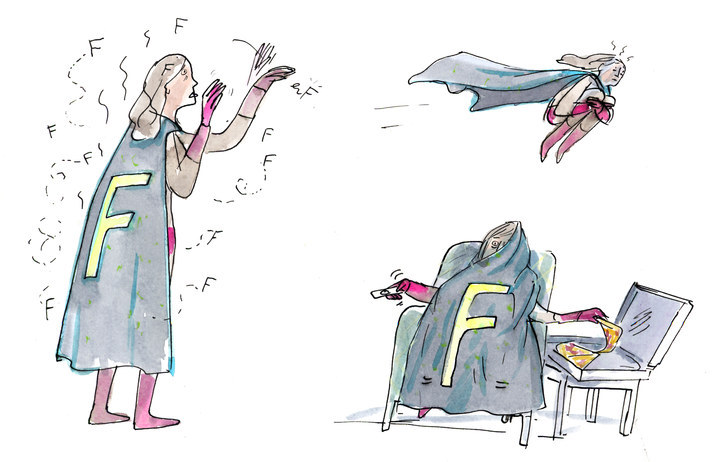
Graham Roumieu for BuzzFeed News
My superpower is the ability to feel like a fraud about everything I do. My other superpower is the propensity to always fear bad things will happen whenever something good occurs. This is because it's scarier for me to feel good than to feel bad. Feeling good is too threatening. If I feel good, I won't be prepared for when the positive situation inevitably sours. If I don't feel like a fraud, then I will be caught off guard when people find out that I am one.
I suppose that I don't believe I deserve to feel good, mostly because I don't meet my own conflicting expectations of myself. Just give me a situation and I will find a way to be wrong. The other day I was hanging out with a bunch of artists and I felt that I was too square, too conformist, a “normie.” I felt so old and dried up that I was basically dead. But a little later I was with a bunch of corporate people and suddenly I was a fucking freak, hyper-confessional, too “out there.” I was somehow 16 again, a mess, as though there were a hole in my shoe and my toe was sticking out. The hole may be seen as literal, or metaphoric, but in either case, I was immature and exposed. I can be inadequate in diametrically opposed ways within the course of the same hour.
Memory functions as a narcotic taskmaster.
I don’t even have to be in the company of real people to imagine their judgments. I keep memories of past lovers rattling around inside me at all times, so as to have judgment readily available. Often, in these memories, I imagine my former lovers issuing decrees about what I’m doing wrong, and I use those imaginary judgments as impetus to be forever fixing myself. My attempts to "be better" — these little missions within the depression of existence — provide a sense of definition and purpose, so that I may feel less powerless over the mystery of life and also of death. In this way, memory functions as a narcotic taskmaster.
Yet all these examples are, of course, ego-based conceptions of identity, involving physicality, occupation, romance, and arbitrary conceptions of cool. Even my political affiliations are, in many ways, merely signifiers of the way I see myself and present myself to the world. One time, a few primary elections ago, the line was too long to vote. So I simply lied to my friends and said that I had voted, whom I had voted for, and why. Yet as soon as I revealed whom I’d pretended to vote for, I regretted my choice of make-believe candidate. I couldn’t even pick the cooler candidate to fake-vote for.
But did I give a fuck about the fact that I hadn't actually voted? No. On the time-space continuum, I am such a blip that it really doesn’t matter what I do. I mean, in the scheme of things, I barely even exist. Perhaps this ambiguity regarding my existence is another component of my feelings of fraudulence. If I don’t exist, it’s insane to pretend I do. It’s dishonest to pretend that things matter.
I also negate myself from an emotional perspective. I’m so afraid of being consumed by my feelings that I’ve been running from them for my entire life. Thus, my feelings are still unfamiliar to me, and whenever I feel one, I can’t believe that is what’s happening. Before the feeling fully surfaces, I will declare its fraudulence.
The other night I was watching My 600-lb Life on TLC. The doctor was being mean to a woman because she wasn’t losing the expected weight from her gastric bypass surgery. Then we cut to the woman at home on her pea-green couch, crying because she was no longer able to be an active part of her son’s life. To follow that up, she lifted up her shirt and revealed a maze of feeding tubes and bruises on her stomach. Apparently the woman was having trouble keeping food down because of the bypass, so she had gone to the local hospital and gotten these tubes put in. Now they were infected.
Suddenly, I couldn’t figure out why I was feeling strange. What was this sensation of doom in my chest? Why was I dizzy? Was I suffocating? For a moment it occurred to me that I might be feeling upset and disturbed because of the show. But I quickly swept that notion under the psychic rug. I couldn’t be the type of person to get upset by a TV show. Yet the sensations persisted, and my mind scrambled to figure out what they could be. My mind said: I feel strange. Why do I feel like this? It’s not the show. But what is it? Oh my god. Am I dying? I'm probably dying.
Within a few moments, I went from casually watching TV to the final minutes of my life. On some level, I suppose imminent death seemed preferable to feeling that sadness. Anxiety is a familiar and safe sensation for me, whereas other feelings — sadness, anger, fear, loneliness — are less familiar. It’s like the anxiety keeps all those other disparate feelings in line. The anxiety is the boss, captain of the team. If I'm not worrying about anything, the anxiety gets pissed off. It needs to run the show. It's like: OMG. She's not making a place for me. Must make a place for me now!
Spiritually, too, there is something that gives me a sense of security in feeling fraudulent or bad. When I “leave myself alone” or “cut myself a break,” I experience a terrible loneliness. Things feel so vacant, so quiet, when I finally cease all the self-flagellation, the attempts to fix and improve myself, and just say I AM. I know that the spiritual masters say surrender is the path to enlightenment. Like, there is supposed to be peace in that place of surrender. But there's also an emptiness there that makes me feel like I am so alone.
It happens to me in meditation. Usually I meditate for 10 minutes a day: enough time to “just be” so I can check “being” off my list of things to do. Occasionally, I will meditate for longer than usual. During these times, I’ve found that I can reach an extended place of deep inner calm, where I feel that I am alone witnessing myself, and the world. It feels really fucking good, and I often have the desire to stay there infinitely. Why should there be a rush to get out of something that feels so good? But inevitably, a voice arises in me and says: Now what?
I can always find someone’s judgment to worry about: a projection of what I imagine another human being, or even a cosmic power, might be thinking of me.
This is the part of me that is scared to feel good, terrified of dissolving into an unbridled ecstasy. Quickly, then, I summon something to make me feel wrong: to create a boundary on the goodness. I can always find someone’s judgment to worry about: a projection of what I imagine another human being, or even a cosmic power, might be thinking of me. It’s as though I’m just not ready to be the witness. I’m not ready for that level of freedom. I still need to be the one who is watched and judged. And the judgment is inevitably cruel.
Let me put it another way. There was once an episode of Golden Girls where Sophia kept buying grapefruit in bulk. At some point, Dorothy was like: "Ma, enough grapefruit. What’s with all of the grapefruit?" So Sophia explained that she felt like God wouldn’t kill her until she finished all the grapefruit. The grapefruit was just a way of staving off death.
This is how it is for me with feelings of fraudulence. I know that this isn’t a pleasant way to live in the world. I know that it isn’t necessary. But the perception that I am being judged gives me something tangible to aim for. Through unnecessary self-improvement I can cordon off the abyss; I can distract myself from deeper existential questions regarding the nature of existence and the fact that I am going to die.
This kind of forward motion feels necessary. In an odd way it is the consistency of hope. It is like a little treadmill on the bigger treadmill of life, where death and aging reign. The little treadmill seems manageable, more doable, even if it is as never-ending as the big treadmill (there is always something to be judged). I am scared to lose the distraction of the little treadmill, to get off it. It means I’ll be getting on the big one.
The truth is, deep down, even I can admit that I'm really not that bad. I'm not the worst human being who ever existed. I don’t fuck everything up. I'm kind to people. I don't wish to cause harm. Let’s say there is no perfect person. In that case, I am just like everyone else. Perhaps even I deserve to feel good once in a while.
I have tried a number of things to get, as they might say, better. It takes a lot of sailors just to keep this ship afloat, and I have certainly put in the effort to change the way I see myself — even if I’ve been afraid to do so. Through cognitive behavioral therapy I learned that when something feels catastrophic, or horrible about myself, I can say: That's just anxiety, it isn’t reality. But the hard part is remembering to say that when you’re having a conversation with someone else. Through psychotherapy I’ve learned the origins of some of these patterns, and how they manifested from childhood. But what always makes so much sense and seems so possible in the therapist’s office — the revelations, the catharses, the aha moments — don’t seem to translate when I’m out in the world.
I’ve also read countless self-help books and watered-down texts on spirituality, personal growth, and learning to accept oneself. Yet these only left me with the impression that self-love could be something spontaneous — like an awakening — and could last forever. I remember reading the Buddhist Pema Chodron on vacation once. I was at the beach in Cape Cod and I read her for hours.
One of the things she said was, “To be fully alive, fully human, and completely awake is to be continually thrown out of the nest.”
I am no longer going to need to control things or obsess about superficial shit.
I was like, yes! OK! I am going to be open to being continually thrown. I am going to bridle that openness and that will be the wellspring from which I garner my power. I am no longer going to need to control things or obsess about superficial shit. I looked at the ocean and its wildness. Everything made sense.
But then a hot woman walked by in a string bikini. Immediately I began comparing my body to her body. Her tits were juicy, her ass was a miracle of youth: biteable like an apple. I felt doughy and pasty compared to her. I tried to figure out what I could do to be better, to be more like her. I needed to fix something and then I would be OK. Then I thought about Pema. My desire for improvement eclipsed Pema. In fact, I kind of felt like fuck Pema. I ended up leaving the book in a public restroom.
I know that Pema and all the others aren’t promising the dream of immediate and finite spiritual rescue — a single epiphany that is sustainable for the rest of your life. I know that they, like the therapists, impart gradually putting in the work. But the long road of mindfulness and slow change is so tiring. The desire to get well — and sometimes those who claim they can help you become your “best self” — can become just another way to judge and measure yourself, and not add up. You can pretend you are more OK than you really are. It can be another form of fraudulence.
Maybe it's fine that this is how I am. Self-love and self-care seem to be in the air right now. The glo-up is trending. Everyone is doing face masks and staying hydrated and shit. But maybe self-acceptance is not about reaching that perfect state of self-adoration, but about accepting that I am always going to find fault.
In the end, I’m going to die. The other shoe is going to drop at some point. Maybe this will just be how I lived my life. Maybe, in some self-effacing way, this is my form of self-acceptance. Perhaps, eventually, I will say that I stopped trying to fight the ways I felt like a fraud. It might be the realest I could get.
Melissa Broder is the author of the essay collection So Sad Today, as well as four collections of poems, including the forthcoming Last Sext. She lives in Venice, California.

Will Varner / BuzzFeed
Every time someone comes out of the lift in the building where you work you wish lift doors were made of glass. That way you'd be able to see who's arriving a little before they actually arrive and there'd be just enough time to prepare the correct facial expression. Your new colleague steps out of the lift dressed just a tad more casually than is really appropriate for the workplace and because you weren't ready you say “Hi!” with altogether too much force. She has: a heart shaped face with subtly rouged cheeks, short, straight, neatly cut hair and eyes that are long rather than wide. She's black, but not local, this new colleague who wears her boots and jeans and scarf with a bohemian aplomb that causes the others to ask her where she shops. “Oh, you know, thrift stores,” she says with a chuckle. George at the desk next to yours says “Charity shops?” and the newcomer says “Yeah, thrift stores…”
Her accent is New York plus some other part of America, somewhere midwest. And her name's Eva. She's not quite standoffish, not quite… but she doesn't ask any questions that aren't related to her work. Her own answers are brief and don't invite further conversation. In the women's toilets you find a row of your colleagues examining themselves critically in the mirror and then, one by one, they each apply a touch of rouge. Their makeup usually goes on at the end of the workday, but now your co-workers are demonstrating that Eva's not the only one who can glow. When it's your turn at the mirror you fiddle with your shirt. Sleeves rolled up so you're nonchalantly showing skin, or is that too marked a change?
Eva takes no notice of any of this preening. She works through her lunch break, tapping away at the keyboard with her right hand, holding her sandwich with her left. You eat lunch at your desk too, just as you have ever since you started working here, and having watched her turn down her fourth invitation to lunch you say to her: “Just tell people you're a loner. That's what I did, anyway.”
Eva doesn't look away from her computer screen and for a moment it seems as if she‟s going to ignore you but eventually she says: “Oh… I'm not a loner.”
Fair enough. You return to your own work, the interpretation of data. You make a few phone calls to chase up some missing paperwork. Your company exists to assist other companies with streamlining their workforce for optimum productivity; the part people like you and Eva play in this is attaching cold, hard monetary value to the efforts of individual employees and passing those figures on to someone higher up the chain so that person can decide who should be made redundant. Your senior's evaluations are more nuanced. They often get to go into offices to observe the employees under consideration, and in their final recommendations they're permitted to allow for some mysterious quality termed potential. You aim to be promoted to a more senior position soon, because ranking people based purely on yearly income fluctuations is starting to get to you. You'd like a bit more context to the numbers. What happened in employee QM76932's life between February and May four years ago, why do the figures fall so drastically? The figures improve again and remain steady to date, but is QM76932 really a reliable employee? Whatever calamity befell them, it could recur on a five-year cycle, making them less of a safe bet than somebody else with moderate but more consistent results. But it's like Susie says, the reason why so many bosses prefer to outsource these evaluations is because context and familiarity cultivate indecision. When Susie gets promoted she's not going to bother talking about potential. “We hold more power than the consultants who go into the office,” she says. That sounds accurate to you: the portrait you hammer out at your desk is the one that either affirms or refutes profitability. But your seniors get to stretch their legs more and get asked for their opinion, and that's why you and Susie work so diligently towards promotion.
But lately… lately you've been tempted to influence the recommendations that get made. Lately you've chosen someone whose figures tell you they'll almost certainly get sacked and you've decided to try to save them, manipulating figures with your heart in your mouth, terrified that the figures will be checked. And they are, but only cursorily; you have a reputation for thoroughness and besides it would be hard for your boss to think of a reason why you'd do such a thing for a random string of letters and numbers that could signify anybody, anybody at all, probably somebody you'd clash with if you met them. You never find out what happens to the people you assess, so you're all the more puzzled by what you're doing. Why can't you choose some other goal, a goal that at least includes the possibility of knowing whether you reached it or not? Face it; you're a bit of a weirdo. But whenever you feel you've gone too far with your tampering you think of your grandmother and you press on. Grandma is your dark inspiration. Your mother's mother made it out of a fallen communist state with an unseemly heap of valuables and a strangely blank slate of a memory when it comes to recalling those hair-raising years. But she has such a sharp memory for so many other things — price changes, for instance. Your grandmother is vehement on the topic of survival and skeptical of all claims that it's possible to choose anything else when the chips are down. The official story is that it was grandma's dentistry skills that kept her in funds. But her personality makes it seem more likely that she was a backstabber of monumental proportions. You take great pains to keep your suspicions from her, and she seems to get a kick out of that.
But how terrible you and your family are going to feel if, having thought of her as actively colluding with one of history's most murderous regimes, some proof emerges that grandma was an ordinary dentist just like she said. A dentist subject to the kind of windfall that has been known to materialize for honest, well regarded folk, in this case a scared but determined woman who held onto that windfall with both hands, scared and determined and just a dentist, truly. But she won't talk about any of it, that's the thing. Cannot you could all understand, or at least have sincere reverence for. But will not?
Your grandmother's Catholicism seems rooted in her approval of two saints whose reticence shines through the ages: St John of Nepomuk, who was famously executed for his insistence on keeping the secrets of the confessional, and St John Ogilvie, who went to his death after refusing to name those of his acquaintance who shared his faith. In lieu of a crucifix your grandmother wears a locket around her neck, and in that locket is a miniature reproduction of a painting featuring St John of Nepomuk, some tall-helmeted soldiers, a few horrified bystanders, four angels and a horse. In the painting the soldiers are pushing St J of N off the Charles Bridge, but St J of N isn't all that bothered, is looking up as if already hearing future confessions and interceding for his tormentors in advance. Boys will be boys, Father, St J of N's expression seems to say. The lone horse seems to agree. It's the sixteenth century, and the angels are there to carry St John of Nepomuk down to sleep on the river bed, where his halo of five stars awaits him. This is a scene your grandmother doesn't often reveal, but sometimes you see her fold a hand around the closed locket and it looks like she's toying with the idea of tearing it off the chain.

Will Varner / BuzzFeed
Suspect me if that's what you want to do.
What's the point of me saying any more than I've said… is it eloquence that makes you people believe things?
You are all morons.
These are the declarations your grandmother makes, and then you and your siblings all say: “No, no, grandma, what are you talking about, what do you mean, where did you get this idea?” without daring to so much as glance at each other.
You were in nursery school when your grandmother unexpectedly singled you out from your siblings and declared you her protégé. At first all that seemed to mean was that she paid for your education. That was good news for your parents, and for your siblings too, since there was more to go around. And your gratitude is real but so is your eternal obligation. Having paid for most of what's gone into your head during your formative years there's a sense in which grandma now owns you. She phones you when entertainment is required and you have to put on formal wear, take your fiddle over to her house and play peasant dances for her and her chess club friends. When you displease her she takes it out on your mother, and the assumption within the family is that if at any point it becomes impossible for grandma to live on her own you'll be her live in companion. (Was your education really that great?) So when you think of her you think that you might as well do what you can while you can still do it.
Eva's popularity grows even as her speech becomes ever more monosyllabic. Susie, normally so focussed on her work, spends a lot of time trying to get Eva to talk. Kathleen takes up shopping during her lunch break; she tries to keep her purchases concealed but occasionally you glimpse what she's stashing away in her locker – expensive looking replicas of Eva's charity shop chic. The interested singletons give Eva unprompted information about their private lives to see what she does with it but she just chuckles and doesn't reciprocate. You want to ask her if she's sure she isn't a loner but you haven't spoken to her since she rejected your advice. Then Eva's office fortunes change. On a Monday morning Susie runs in breathless from having taken the stairs and says: “Eva, there's someone here to see you! She's coming up in the lift and she's…crying?”
Another instance in which glass lift doors would be beneficial. Not to Eva, who already seems to know who the visitor is and looks around for somewhere to hide, but glass doors would have come in handy for everybody else in the office, since nobody knows what to do or say or think when the lift doors open to reveal a woman in tears and a boy of about five or so, not yet in tears but rapidly approaching them – there's that lip wobble, oh no. The woman looks quite a lot like Eva might look in a decade's time, maybe a decade and a half. As soon as this woman sees Eva she starts saying things like please, please, I'm not even angry, I'm just saying please leave my husband alone, we're a family, can't you see?
Eva backs away, knocking her handbag off her desk as she does so. Various items spill out but she doesn't have time to gather them up – the woman and child advance until they have her pinned up against the stationary cupboard door. The woman falls to her knees and the boy stands beside her, his face scrunched up; he's crying so hard he can't see. “You could so easily find someone else but I can't, not now… do you think this won't happen to you too one day? Please just stop seeing him, let him go…”

Eva waves her hands and speaks, but whatever excuse or explanation she's trying to make can't be heard above the begging. You say that someone should call security and people say they agree but nobody does anything. You're seeing a lot of folded arms and pursed lips. Kathleen mutters something about 'letting the woman have her say.' You call security yourself and the woman and child are led away. You pick Eva's things up from the floor and throw them into her bag. One item is notable: a leather bound diary with a brass lock on it. A quiet woman with a locked book. Eva's beginning to intrigue you. She returns to her desk and continues working. Everybody else returns to their desks to send each other e-mails about Eva… at least that's what you presume is happening. You're not copied into any of those e-mails but everybody except you and Eva seems to be receiving a higher volume of messages than normal. You look at Eva from time to time and the whites of her eyes have turned pink but she doesn't look back at you or stop working. Fax, fax, photocopy. She answers a few phone calls and her tone is on the pleasant side of professional.
An Anti-Eva movement emerges. Its members are no longer fooled by her glamour; Eva's a personification of all that's put on earth solely to break bonds, scrap commitments, prevent the course of true love from running smooth. You wouldn't call yourself Pro-Eva, but bringing a small and distressed child to the office to confront your husband's mistress does strike you as more than a little manipulative.
Maybe you're the only person who thinks so: that side of things certainly isn't discussed. Kathleen quickly distances herself from her attempts to imitate Eva. Those who still feel drawn to Eva become indignant when faced with her continued disinterest in making friends. Who does she think she is? Can't she see how nice they are?
“Yes, she should be grateful that people are still asking her out,” you say, and most of the people you say this to nod, pleased that you get where they're coming from, though Susie, Paul and a couple of the others eye you suspiciously. Susie takes to standing behind you while you're working sometimes, and given your clandestine meddling this watchful presence puts you on edge. It's best not to mess with Susie.

Will Varner / BuzzFeed
One lunchtime Eva brings her sandwich over to your desk and you eat together; this is sudden but after that you can no longer mock others by talking shit about Eva; she might overhear you and misunderstand. You ask Eva about her diary and she says she started writing it the year she turned thirteen. She'd just read the Diary of Anne Frank and was shaken by a voice like that falling silent, and then further shaken by the thought of all the voices who fell silent before we could ever have heard from them.
“And, you know – fuck everyone and everything that takes all these articulations of moodiness and tenderness and cleverness away. Not that I thought that's how I was,” Eva says. “I was trying to figure out how to be a better friend, though, just like she was. I just thought I should keep a record of that time. Like she did. And I wrote it from thirteen to fifteen, like she did.”
You ask Eva if she felt like something was going to happen to her too.
“Happen to me?”
You give her an example. “I grew up in a city where people fell out of windows a lot,” you say. “So I used to practice falling out of them myself. But after a few broken bones I decided it's better just to not stand too close to windows.”
Eva gives you a piercing look. “No, I didn't think anything was going to happen to me. It's all pretty ordinary teen stuff in there. Your city, though… is 'falling out of windows' a euphemism? And when you say 'fell,' or even 'window' are you talking about something else?”
“No! What made you think that?”
“Your whole manner is really indirect. Sorry if that's rude.”
“It's not rude,” you say. You've already been told all about your indirectness, mostly by despairing ex-girlfriends.
“Can I ask one more question about the diary?”
Eva gives a cautious nod.
“Why do you still carry it around with you if you stopped writing in it years ago?”
“So I always know where it is,” she says.
Susie gets restless.
“Ask Miss Hoity Toity if she's still seeing her married boyfriend,” she says to
you.
You tell her you won't be doing that.
“The atmosphere in this office is so stagnant,” Susie says, and decides to try and make Miss Hoity Toity resign. You don't see or hear anyone openly agreeing to help Susie achieve this objective, but then they wouldn't do that in your presence, given that you now eat lunch with Eva every day. So when Eva momentarily turns her back on some food she's just bought and turns back to find the salad knocked over so that her desk is coated with dressing, when Eva's locker key is stolen and she subsequently finds her locker full of condoms, when Eva's sent a legitimate looking file attachment that crashes her computer for a few hours and nobody else can spare the use of theirs for even a minute, you just look straight at Susie even though you know she isn't acting alone. Susie's power trip has come so far along that she goes around the office snickering with her eyes half closed. Is it the job that's doing this to you all or do these games get played no matter what the circumstances? A new girl has to be friendly and morally upright; she should open up, just pick someone and open up to them, make her choices relatable. “I didn't know he was married” would've been well received, no matter how wooden the delivery of those words. Just give us something to start with, Miss Hoity Toity.
Someone goes through Eva's bag and takes her diary; when Eva discovers this she stands up at her desk and asks for her diary back. She offers money for it: “Whatever you want,” she says. “I know you guys don't like me, and I don't like you either, but come on. That's two years of a life. Two years of a life.”
Everyone seems completely mystified by her words. Kathleen advises Eva to 'maybe check the toilets' and Eva runs off to do just that, comes back empty handed and grimacing. She keeps working, and the next time she goes to the printer there's another print out waiting for her on top of her document: RESIGN & GET THE DIARY BACK.
If you don’t think he grew into a wizard Ben Wyatt, then you’re wrong.
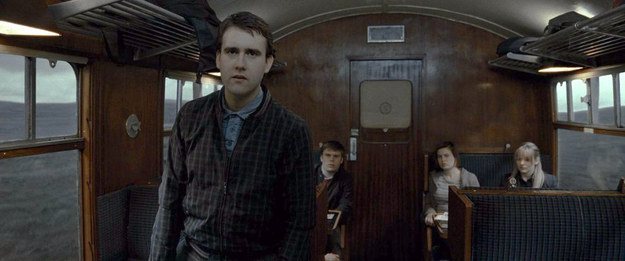
Neville would hold my earrings and blush in the background. As I fight you.
Warner Bros.

Stephen Lovekin / Getty Images

STAN HONDA / Getty Images
No coordination needed. Cooperation will suffice.
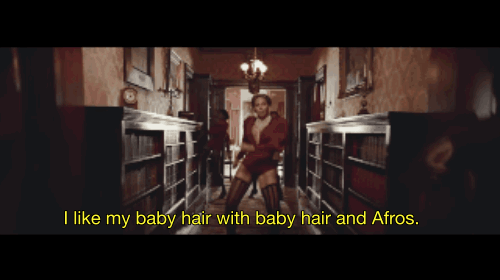

Forcing us to lose our minds once more.
@Beyonce / Via instagram.com
When that black power and woman power intersect.
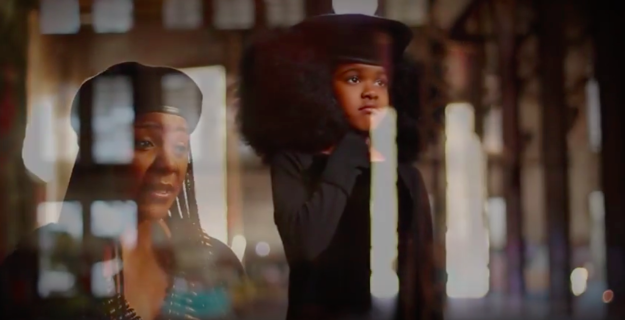
Ernestine Johnson / Via youtube.com
“If I lay here, if I just lay here, will you just leave me alone and let me read my book?”

Littlebee80 / Getty Images / Thinkstock / Via warehouse-agent-in-training.tumblr.com

Karmanov / Getty Images / Thinkstock / Via oyasumiseki-moved.tumblr.com


Targovcom / Getty Images / Thinkstock / Via schtickboy-deactivated20150811.tumblr.com
Oh boy.

St. Martin's Press

From Irish Farmers by Ciara Ryan. Copyright © 2016 by the author and reprinted by permission of St. Martin’s Press

From Irish Farmers by Ciara Ryan. Copyright © 2016 by the author and reprinted by permission of St. Martin’s Press

From Irish Farmers by Ciara Ryan. Copyright © 2016 by the author and reprinted by permission of St. Martin’s Press
“I loved that she had thoughts that I thought only I had.”

Channel 4 / BuzzFeed
"It wasn't made when I was a teenager but when I watched the show it reminded me so much of myself at 16. Rae is relatable because of her insecurities, her tendency to compare herself to those around her and her self-abhorrence. Also I loved that she had thoughts that I thought only I had."
Submitted by chloet1991.
"Rae, with her struggles to accept herself, helped me grow to love and respect who and what I am during the most difficult time of my year. Rae means the world to me and I hold her very dearly in my heart."
Submitted by Iona Bulloch, Facebook.
"Similar to Charlie, I was sexually abused as a child by a very close relative. I was too young to understand it, but the vague memories I have suppressed still haunt me. I had depression as a teenager, and the abuse was something that I would always go back to in my mind. I have yet to tell anyone about it. Reading Charlie's emotions on paper really helped me in seeing that my post traumatic stress was valid."
Submitted anonymously.
“I loved that she had thoughts that I thought only I had.”

Channel 4 / BuzzFeed
"It wasn't made when I was a teenager but when I watched the show it reminded me so much of myself at 16. Rae is relatable because of her insecurities, her tendency to compare herself to those around her and her self-abhorrence. Also I loved that she had thoughts that I thought only I had."
Submitted by chloet1991.
"Rae, with her struggles to accept herself, helped me grow to love and respect who and what I am during the most difficult time of my year. Rae means the world to me and I hold her very dearly in my heart."
Submitted by Iona Bulloch, Facebook.
"Similar to Charlie, I was sexually abused as a child by a very close relative. I was too young to understand it, but the vague memories I have suppressed still haunt me. I had depression as a teenager, and the abuse was something that I would always go back to in my mind. I have yet to tell anyone about it. Reading Charlie's emotions on paper really helped me in seeing that my post traumatic stress was valid."
Submitted anonymously.
We now go live to the bromance that is Jeff Zucker and Donald Trump.
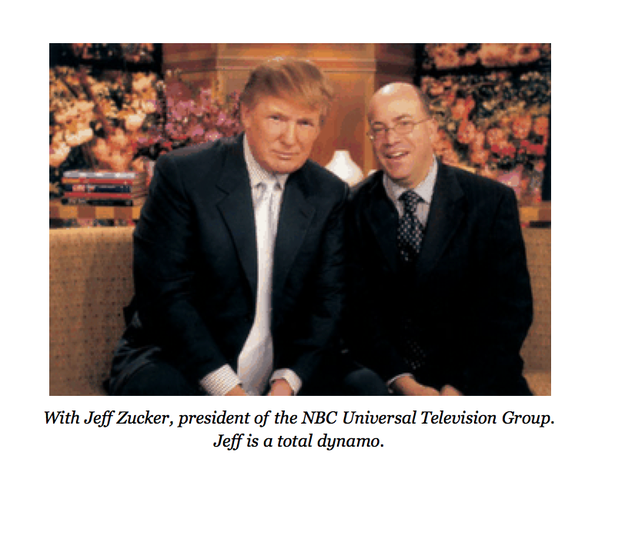
Think Like A Billionaire
CNN president Jeff Zucker has said it wasn't his role to build up or take down a president campaign.
Zucker, asked in December if he thought Donald Trump was a demagogue, said CNN's role didn't include taking a position on that either way but was to broadcast what a candidate puts out there. The CNN chief called such views "editorializing" in a way CNN does not.
"There have been people who have asked about the amount of coverage that Trump gets," Zucker said at a talk at the Paley Center for Media when asked about his role in perpetuating Donald Trump's rise and if he thought Trump was a demagogue. "I don't think it's our role to editorialize the way you are in asking me the questions."
"I think, I think, I think that is your opinion," Zucker continued, when asked if it was editorializing or just fact to say Trump was a demagogue. "I'm not taking a point of view, I don't think it's our role to take a point of view. I think it's our role to report what he says, what he does, to fact check what he says, what he does. Really it's not our role to build up a campaign or to take down a campaign. It's our role to be skeptical of what every candidate puts out there and says. I think that's the role. It's not our role to editorialize the way I think that some of those comments are."
A review of records, specifically Trump's books and past speeches show just how close Zucker and Trump have been. Zucker, greenlit The Apprentice as head of NBC and receives a near thirty mentions in Trump's books since 2004. In Trump speeches across the years, The Donald often praised Zucker for approving the show and mentions how great the NBC chief thought it was.
Trump's 2004 book, Think Like a Billionaire includes 20 references to Zucker (often with glowing praise) and carries Trump's view of their day-to-day interactions. Trump's book even includes a picture of the two intimately posing for a photo with Trump calling Zucker a "total dynamo."
"Right before I went on the air, the brilliant head of NBC, Jeff Zucker, told me he was already receiving instant reports that the audience watching our program was going to be huge," wrote Trump. "That wasn't exactly what I needed to hear before appearing on live national television, but it turned out to be a truly exhilarating experience."
In another instance, again with Trump calling Zucker brilliant, Trump recounts Zucker making a pilgrimage to Trump Tower to ask Trump to host SNL.
"One day in late March 2004, Jeff Zucker, the brilliant president of NBC, called to make an appointment to see me at my office. I knew something big must be up for him to pay a personal visit," Trump writes. "He said, 'I'd like to see you.' So he arrived at my office and said, 'Donald, do me a favor. Host Saturday Night Live.' I like and respect Jeff a great deal, and we'd been experiencing a tremendous success with The Apprentice, so I couldn't say no."
That 2004 SNL episode featured a parody version of Zucker, played by Jimmy Fallon, groveling.
"I'm the only thing they've got on this network that's any good now," Trump says in the skit.
After introducing parody shows such as Fruits and Nuts and Law and Order, Queer Squad, an exasperated Zucker finds himself saying, "You're right, you're the only thing we have on this network. Thanks so much. I'm fired."
According to Trump, Zucker told Trump the show was great, they headed to the after party which ran until the early morning.
"After the show, I signed some photos for the crew, including one that will hang in the hallowed halls of Saturday Night Live for all time. It was a night to remember. Both Lorne Michaels and Jeff Zucker seemed pleased with the show, and I thanked them for a wonderful experience," writes Trump. "We all left for the aftershow party. For the record — and this may be a record — I got home at 6 a.m. on Sunday. Just in time to get up and read my newspapers and start a new day . . . and to top it all, the ratings turned out to be great!"
Trump's 2007 book Think Big and Kick Ass also contains some fond anecdotes involving Zucker. Zucker called Trump on his birthday, for instance.
"Then I get another call at about seven o'clock from the president of NBC, Jeff Zucker, who had the guts to go with The Apprentice in the first place," wrote Trump. "He said, 'Donald, I just wanted to wish you a very happy birthday.'"
Even Trump was a little shocked with the early morning birthday wish.
"Then my wife, Melania, rolled over and said, 'Who was that?' I said, 'Some people from NBC wishing me a happy birthday.' She said, 'Happy birthday, darling!' Can you believe that? The heads of NBC wished me a happy birthday before seven in the morning?"
Later, Trump wrote, Zucker heaped more praise on The Donald. Trump even let Zucker get away with a dig on his hair.
"Not long after, Zucker, who's now CEO of NBC Universal, spoke at a big meeting and said something I will never forget, because Friends was in its last season, and The Apprentice followed Friends. He said very, very nicely, 'Donald Trump may not have hair as good as Jennifer Aniston, but he's got great ratings.' I didn't mind that he made a crack about my hair because everyone else does."
The Extremely Loud and Incredibly Close author’s first book in a decade.

Here I Am is the story of a family in crisis. As Jacob and Julia confront their collapsing marriage in Washington, DC, a catastrophic earthquake devastates the Middle East, sparking a pan-Arab invasion of Israel. At stake is the very meaning of home – and the fundamental question of how much life one can bear.
Hamish Hamilton

Penguin / FSG
In a joint statement, Eric Chinski, editor-in-chief at Farrar, Straus & Giroux, Simon Prosser, publishing director at Hamish Hamilton and Penguin UK, and Nicole Winstanley, publisher at Penguin Books Canada, said:
What should a book cover look like for an author as original, as questing, and as full of aliveness as Jonathan Safran Foer? The answer, since the start, has come from the brilliant graphic imagination of gray318, aka Jon Gray – and it is a thrill to see how he has risen to the challenge of representing to the world what we all feel is Jonathan's greatest book yet.
“…I think we’re at war?”

Isolated and surprised by the attack, the military is overwhelmed, and none of Australia's allies are able to come to the rescue.
ABC3

ABC3
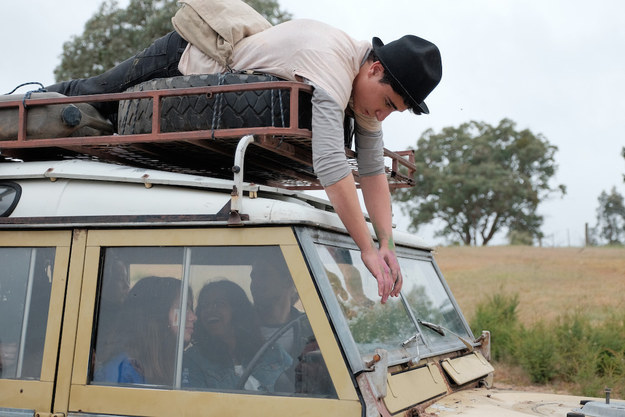
They're joined by Sibylla Budd, Deborah Mailman, James Stewart, and Alison Bell.
ABC3
13 Delicious Boozy Drinks To Build Your Next Trip Around